Bourbon 102
- By Sharon Durmaskin
- •
- 01 Mar, 2018
Where was bourbon born?
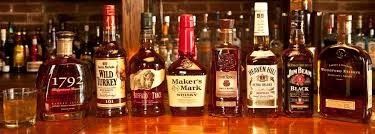
This month we’re continuing our education about bourbon. Bourbon experts will tell you there’s no right or wrong way to enjoy the spirit, so feel free to mix it with water, ginger ale, a maraschino cherry…whatever you like.
However, experts disagree on exactly who invented bourbon and where the name came from. Some in Kentucky will tell you it came from Bourbon County, Kentucky where they claim bourbon was first made by a Baptist preacher/distiller named Elijah Craig. When Craig’s distillery burned down, he repurposed the charred barrels for aging his liquor. That resulted in a very smooth type of whiskey with a light caramel color. The story goes that Craig sold his concoction in barrels labeled with where his product originated--the region of Kentucky known as “Old Bourbon.”
Meanwhile, other historians swear it was actually another resident of Bourbon County, distiller Jacob Spears, who first labeled his barrels of corn whiskey as “Bourbon Whiskey.”
Then there’s the tale of two brothers from Cognac, France who settled in Louisville after fleeing the political turmoil in their country. Legend has it that around 1807, these brothers took a chance on shipping Kentucky whiskey down to New Orleans. According to Louisville, Kentucky, historian Michael Veach, the brothers decided since French New Orleans was partial to cognac and brandy, they’d also enjoy their corn whiskey. And they were right. Soon people requested that “whiskey sold on Bourbon Street.” And thus, a name was born.
Now that you know how bourbon was born, how do you know which bourbon is right for you? Good question. We’ll talk about that next month.
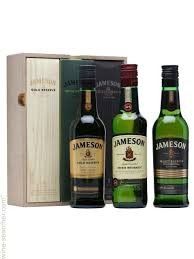
In honor of St. Patrick’s Day, this month’s blog article is about Jameson Irish Whiskey. Jameson is a blended Irish whiskey with a long history. It was originally founded as The John Jameson and Son Irish Whiskey Company in 1810 when John Jameson and his son (also John Jameson) bought the Bow Street Distillery in Dublin. The distillery was already in the family, though, because it had been built by John’s wife’s cousin in 1780. Jameson was a Scottish lawyer who had Margaret Haig of the Haig distilleries family. In 1786, John Jameson moved and his wife moved to Dublin to manage the Stein's Bow Street Distillery. Now you know why Jameson uses 1780 in their marketing; it’s when their whiskey was born.
Jameson is produced from a blend of single pot still whiskey and grain whiskey. It uses a mixture of malted and "green" Irish barley, which is sourced around the distillery in Cork. The barley is dried in a closed kiln fired by natural gas. This process is what gives Jameson its distinctive flavor.
There are 21 varieties of Jameson whiskey, including the classic Jameson 12-Year-Old Special Reserve. Jameson is great on its own, with ice or with Ginger Ale. Actually, Jameson is great any way you like.
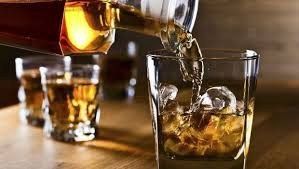
Before you head to the liquor store for a bottle of whisky, it might be a good thing to know the best whisky on the US market. So, here’s the list of what many whisky connoisseurs consider the top.
First, is Booker’s 30th Anniversary. It’s a blend of both 9-year-old and 16-year-old Kentucky Straight Bourbon whiskies. This whisky is a tribute to Booker Noe, the man who made small batch bourbon a thing.
New Riff Bottled In Bond is the first bourbon distilled, aged, and bottled by New Riff. When you taste it, you’ll notice butterscotch and oak notes, with some vanilla and rye spice in the background. You might also taste cinnamon, clove and dark berries.
Michter’s US*1 Toasted Barrel Finish Bourbon is secondarily aged in a custom-made barrel composed of toasted 18-month air-dried wood. The toasted barrels lend a nice smokiness to the bourbon.
Wild Turkey Master’s Keep: Revival is a blend of Kentucky straight bourbons aged 12-15 years that are finished in at least 20-year-old Oloroso sherry casks. The whiskey is rich in cherry, raisin and vanilla notes on the nose, followed by a palate rich in fruitcake-like tropical fruit and spice flavors.
Old Forester Birthday Bourbon was released to mark the anniversary of Founder George Gavin Brown’s birthday. It’s a blend of 120 12-year-old barrels. You’ll find cherry cobbler on the nose and palate, with caramel, chocolate, and honey— like a birthday cake, but better.
Knob Creek Twice Barreled Rye is aged in new American oak barrels, then transferred to another set of new American oak barrels for finishing. The result is unlike other ryes on the market, with high levels of oak, vanilla, and caramel on the nose, and a sweeter palate than you might expect. The oak and spice come back on the finish, which is long and lingering.
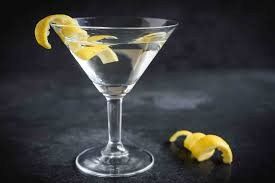
We all love martinis and it turns out we’re in great company. Some really famous people love them, too. For instance, President Franklin Roosevelt loved martinis, although history tells us he was a terrible mixer and often used some rather interesting ingredients, like anisette or fruit juice.
President Richard Nixon was another martini lover and supposedly
he was drinking a martini the night the Watergate crisis drove him from office.
Wow.
Author Ernest Hemingway’s favorite martini was The Montgomery. It’s named after
the WW2 British Field Marshall who liked his odds on the battlefield to be 15-1.
And that’s the way Hemingway liked his drinks: 15 parts gin, and one part
vermouth.
Comedian/actor WC Fields really was the lush he portrayed on screen.
Apparently, he started his day with two double martinis--one before and one after
breakfast. We’ll stick with coffee, but whatever works. Fields also carried an
oversized cocktail shaker full of martinis to the studio for the days’ shoot.
He drank about two quarts of gin a day!
The most famous martini drinker is probably our favorite spy, James Bond. He
always asks for it to be large, very strong, very well made and shaken, not
stirred. The Martini called The Vesper is named after a beautiful blond double
agent called Vesper Lynd. According to Bond’s creator, Ian Fleming, the first
mention of this martini was in the book Casino Royale, in which Bond told the
bartender:
"A dry martini," Bond said. "One. In a deep champagne goblet."
"Oui, monsieur," replied the Bartender.
"Just a moment. Three measures of Gordon's, one of vodka, half a measure of Kina Lillet. Shake it very well until it's ice-cold, then add a large thin slice of lemon peel. Got it?"
"Certainly, monsieur." The barman seemed pleased with the idea.
"Gosh, that's certainly a drink," said Leiter.
Bond laughed. "When I'm...er...concentrating," he explained, "I never have more than one drink before dinner. But I do like that one to be large and very strong and very cold and very well-made. I hate small portions of anything, particularly when they taste bad. This drink's my own invention. I'm going to patent it when I can think of a good name."
On the television show M*A*S*H the characters Hawkeye, Trapper and B.J made their own gin to make martinis. In the first-season episode "Chief Surgeon Who?", Hawkeye declares, "Actually, I'm pursuing my lifelong quest for the perfect, the absolutely driest martini to be found in this or any other world. And I *think* I may have hit upon the perfect formula."
Upon hearing this, Trapper asks, "Five-to-one?"
Hawkeye replies, "Not quite. You pour six jiggers of gin, and you drink it while staring at a picture of Lorenzo Schwartz, the inventor of vermouth."
Actually, that’s not right. Vermouth was invented by Antonio Benedetto Carpano. But you get the point.
For an aperitif, Queen Elizabeth II likes a dry martini, stirred not shaken, finished with a twist of lemon rind.
And, actor Humphrey Bogart's last words were "I should never have switched from scotch to martinis."
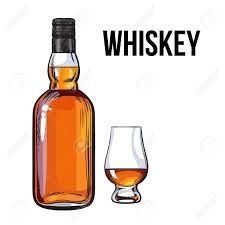
Looking for a unique holiday gift for that whiskey lover in your life? Here are six rare and pretty extravagant whiskeys to give this season.
James Thompson & Brother Final Reserve 45-Year Bourbon
This 45-year old whiskey was distilled at Yellowstone Distillery in 1972. It’s the oldest bourbon ever bottled and only 250 bottles are available. Careful, though; this bourbon is 115 proof and costs $1,800. But 90% of the proceeds go to a veteran’s charity, and 10% go to the Frazier Museum.
Very Old Carter 27-Year Old American Whiskey
Old Carter Whiskey Co. debuted this year and it’s been quite the year for this company. They’ve released five different uncut, unfiltered types of bourbon, whiskey, or rye. The oldest (and rarest) of these is Very Old Carter 27-Year American Whiskey. These special bottles come in a handmade wooden box branded with the Old Carter logo. Three separate single barrel releases (of varied barrel proof) totaling less than 150 bottles are available to the public at $550 each.
The Last Drop Distillers 1982 Bourbon
Here’s an interesting factoid about this distiller: they travel around the world looking for rare, forgotten whiskey barrels to share with their fans. This year, The Last Drop Distillers has released this 18-year single barrel bourbon distilled in 1982 at Buffalo Trace. If you can find one of just 44 bottles in existence be aware--it comes with a hefty $4,000 price tag.
Michter’s 20-Year Bourbon
This batch of Michter’s 20-Year is their first in over two years. Michter’s has exacting standards for their limited releases, waiting for the perfect moment in the aging process rather than rushing to get bourbon on the shelf. This 20-year release was bottled at—yikes--114.2 proof! And it costs around $700. Happy holidays, indeed.
1993 Vintage O.F.C. Bourbon
Buffalo Trace’s O.F.C. line pays homage to the Old-Fashioned Copper Distillery, founded in 1870 on the very same spot as the current Buffalo Trace distillery. Only 822 bottles of this 25-year release is available to the public. This 90-proof bourbon comes packaged in a beautiful crystal and copper decanter, with a $2,500 price tag.
Heaven Hill 27-Year Bourbon
The Heaven Hill distillery suffered heavy damage from a fire in 1996, so “pre-fire” barrels like these are very special. Less than 3,000 bottles of this 27-year old barrel proof bourbon were released this fall, from a small batch of just 41 barrels. This 94.7 proof (yes, that’s low for a barrel proof) bottling comes packaged in an intricate wooden box on a silk pillow for around $400.
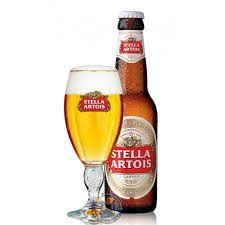
One of our most popular beers is Stella Artois, so this month’s blog article is about Stella’s origins.
The Den Hoorn Brewery was established around 1366 in Leuven, Belgium. Den Hoorn laid the foundation for the taste and standard Stella Artois is known for. The symbol of the Den Hoorn Brewery, a horn, is displayed in Stella Artois' cartouche.
In 1708 Sébastien Artois was admitted to the Leuven Brewer’s Guild in Belgium as a Brew Master. He soon became head brewer at the Den Hoorn Brewery and bought it in 1717, renaming it Brouwerij Artois .
By 1926 the Artois Brewery was so beloved internationally and locally, that a special batch was created as a Christmas gift to the people of Leuven. That special batch was the first to officially include "Stella" in its name. "Stella", meaning star in Latin, pays homage to this original occasion, accompanied by a star on every bottle.
There are several steps taken to ensure your pint of beer is perfect every time. First, Stella is chilled to between 3-5°C and of course you should enjoy Stella Artois in its unique chalice:
· The chalice gets a bath in cold water to keep the head foamy.
· The chalice is held at a 45-degree angle for the perfect combination of foam and liquid.
· While the chalice is slowly straightened, a perfect head is formed.
· Finally, a skimmer trims the head to the perfect height.
Enjoy your Stella Artois!
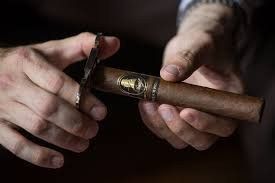
Ready to join the ranks of cigar smokers, but afraid you’ll look like a doofus if you do something wrong? Never fear…we’re here to help.
The first thing to do is choose a few single cigars to practice with. Don’t buy a box of stogies until you know what kind you like. Going to a tobacco shop is a good idea. And don’t be afraid to ask for advice. Everyone does.
What Kind to Choose
Beginners should stick with mild cigars to start with because cigars with a bolder flavor could taste bad or too strong. Mild-tasting cigars are also generally less expensive. When you’ve chosen a cigar, the next step is to look it over. Gently squeeze it to make sure there aren’t any hard or soft spots. These could mean the cigar will have a bad draw. Then, look over the wrapper and inspect it for discoloration or cracks.
Protecting Your Cigars
If you haven’t bought a humidor yet, then don’t buy more stogies than you can smoke in a few days. And keep them in the cellophane wrapper (if it has one) until you’re ready to light up. Leaving a cigar exposed to the elements (inside air, sunlight, etc.) can dry it out. In a pinch, you can store your cigars in a small container, like Tupperware.
Cutting Your Cigar
Here’s an important tip: don’t cut your cigar until you’re ready to smoke it, otherwise it could unravel or dry out. The closed end—the head—is the end you put into your mouth. There are three basic styles of cuts: the straight cut guillotine cutter, which is the most common; the V-cut/Wedge cutter and the punch cutter. You should choose the one you’re most comfortable with. You can also bite the end off like they did in the olden days, but you run the risk of causing the wrapper to unravel and getting bits of tobacco in your mouth.
To light your cigar, always use either a butane lighter or wooden matches. This is to ensure you don’t allow chemicals or other flavors to ruin the natural flavor of your cigar. Hold your cigar around the band using your thumb, middle finger and index finger and put it in your mouth. Don’t let the cigar touch the flame, but rather, hold it just above the fire. Start puffing and rotating the cigar until the tobacco around the rim starts to glow and it draws easily. Keep puffing and rotating about every 30 to 60 seconds to keep the cigar lit. And don’t inhale the smoke. Cigar smoke is thicker than cigarette smoke and should not be inhaled. Just taste the smoke in your mouth for a few seconds and blow it out. You can smoke the cigar as far down as you like.
If you need help or advice about cigars, the staff at Mort’s is always eager to help.
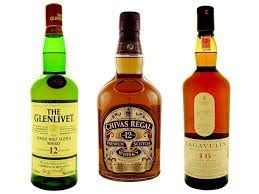
It all comes down to the distillation process. That’s basically the difference between single malt and blended Scotch. While single malt is made and bottled in a single distillery, blended Scotch is a mixture of two or more malt and grain whiskies.
Legally, Single Malt Scotch Whisky has to be produced at a single distillery in Scotland using a pot still and 100% malted barley. It’s required to be matured for a minimum of three years in oak casks and the casks can’t be any larger than 700 liters, or just under 154 gallons. Examples of Single Malt Scotch are Glenlivet, Macallan and Glenfiddich.
On the other hand, Blended Scotch Whisky is made from a blend of malt whiskies. It originates at more than one distillery. This whisky can be made from any cereal grain, like corn, wheat or rye, and it’s distilled in a column still. This whisky also has to be matured for a minimum of three years in oak casks no larger than 700 liters. Blended Scotch includes Johnnie Walker, Chivas Regal and J&B.
Both are intricate processes that require a master distiller. Since all barley—or any other grain--doesn’t quite taste the same, the distiller must recreate the same flavor profile every time. When you think about it, that’s a big task. Other than barley, yeast, water and a coloring additive are combined to make the final product. Peat smoke is often included to give the whisky a smoky flavor.
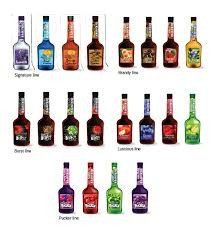
DeKuyper liqueurs and cordials have been around since 1695 when Petrus DeKuyper, a Dutchman, founded the company that bears his name. DeKuyper began as a manufacturer of barrels and casks used for spirits and beer. By 1752, the family owned a gin distillery in Schiedam, Holland. In the 19th century, the company expanded its export business throughout Europe, Great Britain and Canada. In 1911, a new distillery was built in Schiedam and production of both gin and liqueur began.
All of the 70-plus DeKuyper cordials and liqueurs are made by mixing or redistilling distilled spirits with all-natural fruits, plants, or pure juices, or with extracts derived from infusions, percolation, or maceration of these ingredients. Virtually every part of the fruit, and sometimes, vegetable, is used including the skins, seeds, roots, flowers, leaves and pulp, as well as natural extracts and concentrates.
Some of DeKuypers flavors include Alabama Slammer, Kamikaze, Razzmatazz and ButterShots.
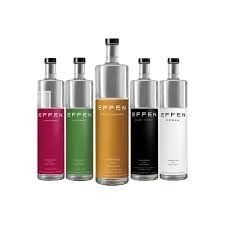
You’ve probably had a drink here at Mort’s that was made with Effen Vodka, but do you know where it comes from and how it’s made? Effen Vodka is imported from Holland; in fact, the word Effen is Dutch for “smooth, even, and balanced.”
Effen starts with premium wheat from Northern France. This wheat is low in fatty acids and contains a pure starch. That makes the vodka silky and smooth, not to mention, delicious. The water used to make Effen comes from a virtually untouched natural local reservoir. Through reverse osmosis, hydraulic pumps force this pure water upward vertically through a series of filters and a specialized membrane. Why the upward pressure? Because this extra process removes more impurities than standard filtration. The filtration process also utilizes active carbon, and the continuous distillation process means the liquid circulates through giant stainless-steel columns. The vodka is distilled literally hundreds of times, and the heating during this process happens at temperatures below 85 degrees. This means the vodka has no traces of burnt sugar and no “off notes.”
Add that to the all-natural ingredients and you have a smooth tasting vodka that’s very nice on the palate. The range of flavors include Black Cherry, Raspberry and Cucumber, in addition to newcomers Blood Orange and Green Apple.
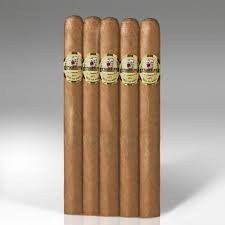
Wrapper: Honduran
Taste: Sweet body
Size: 7x48
Baccarat Cigars are one of the mildest cigars on the market and in its 140-year history, Baccarat has become one of the best-selling cigars in the United States. With tobacco grown from Cuban seed and cultivated in Honduras, these stogies are popular with both seasoned and new cigar smokers. The Honduran tobaccos give Baccarat cigars their smooth, creamy and toasty notes. And that sweet finish comes from the sugar-lined wrapper; something found only in Baccarat cigars. Beautifully constructed, Baccarat Cigars are great everyday cigars that offer a fantastic value smoke without compromising on taste. And the name Churchill? That’s an homage to one of the cigar’s biggest fans, Winston Churchill.